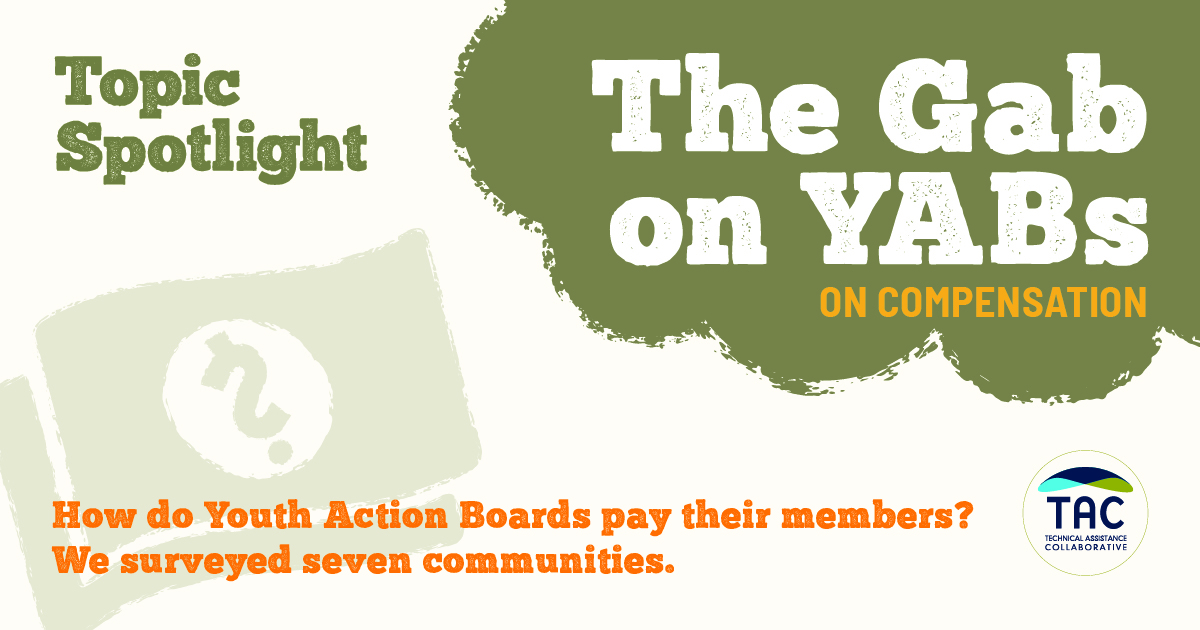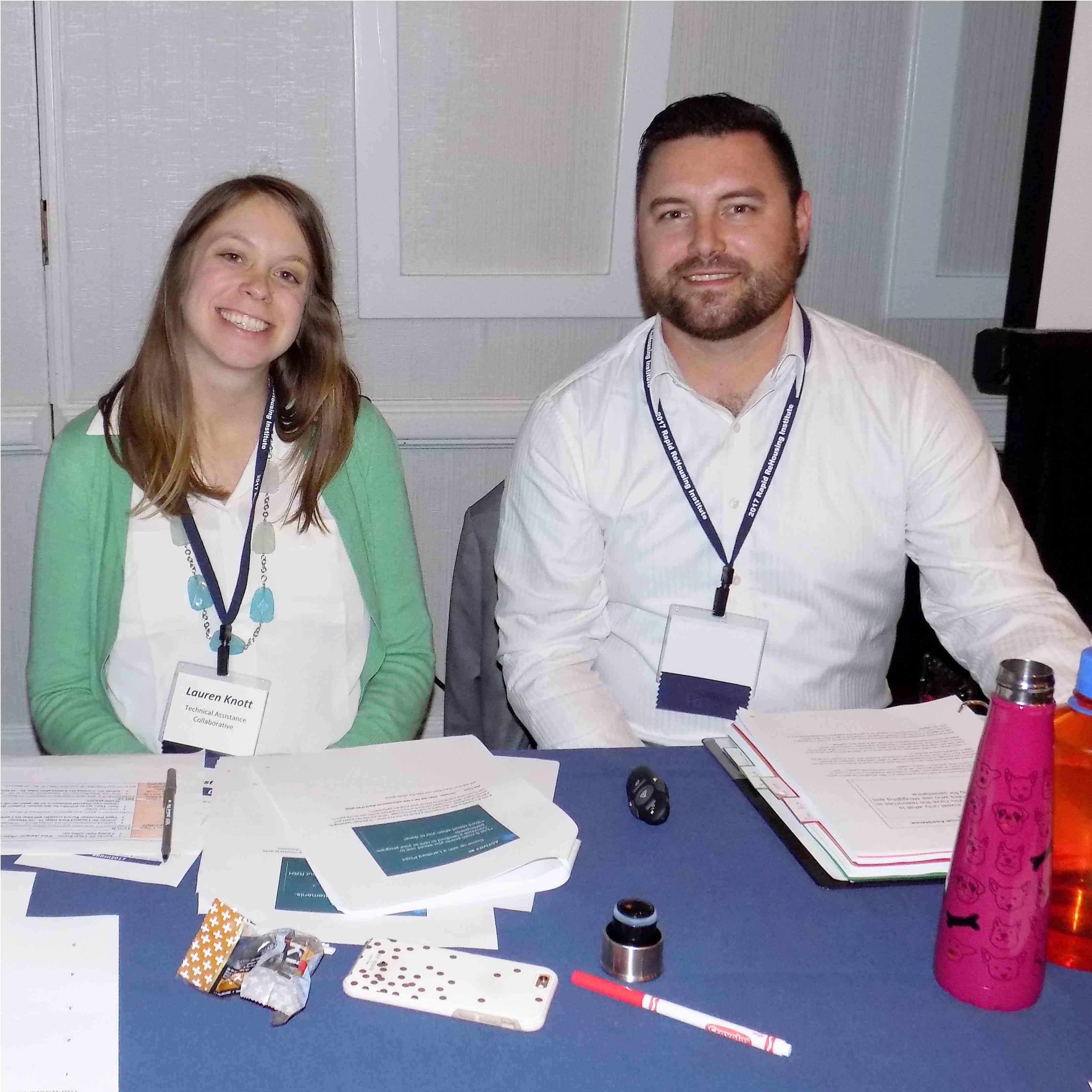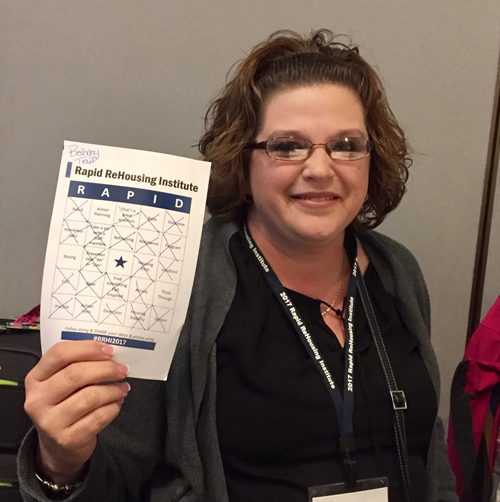Access: The TAC Blog
News, Resources, & Happenings at TAC: February 2020
Beyond Pizza — How Communities Handle Compensation and other Practical Issues with Young Adult Partners
Communities working to end youth homelessness are increasingly bringing youth and young adults with lived experience of homelessness to the forefront of their planning and implementation efforts, often with the support of a HUD Youth Homelessness Demonstration Program award. Of course, the young people who contribute their energy and insights should be compensated for their time - but how, and how much? TAC Senior Associate Lauren Knott, together with consultant Lauren Leonardis, surveyed a range of Youth Action Boards (YABs) to find out how they handle this and other challenges. The results are available as The Gab on YABs, a collection of community fact sheets and topic spotlights full of useful information for any community committed to fully incorporating youth and young adult leadership.
Tools for Successful State Partnerships between Medicaid and Housing Agencies
From 2016 to 2018, sixteen states participated in a Centers for Medicare and Medicaid Services (CMS) Innovation Accelerator Program (IAP) State Medicaid-Housing Agency Partnerships track. The tools developed and used to provide technical assistance to these states, incorporating the work and expertise of many TAC colleagues, form the basis of a new State Medicaid-Housing Agency Partnerships Toolkit published recently to the LTSS website. The toolkit is designed to assist states as they consider systems-level changes that further community integration, including the intersection between health care and housing. It is available for states to download, use, and adapt.
Trainings for Trainers in a Unique Rapid Resolution Pilot Program for Veterans
TAC has recently hosted several three-day events focused on homelessness diversion and rapid exit strategies for Veterans. These "train the trainers" sessions, conducted in partnership with the Cleveland Mediation Center and Abt Associates, are part of our support for the Department of Veterans Affairs' Supportive Services for Veteran Families (SSVF) program. Over the past two years, TAC and our partners have provided a wide range of onsite, remote, and training technical assistance in the development and rollout of SSVF's "Rapid Resolution" initiative, the first nationwide federal effort of its kind - a pilot program that supports diversion strategies for Veterans who are entering homelessness or have only recently become homeless. The recent trainings teach critical diversion and rapid exit skills in the context of SSVF's program design and implementation, with an emphasis on giving practitioners the tools they need to transfer that knowledge to their home communities. The training effort is led by TAC Senior Associate Douglas Tetrault, with strong support from other TAC staff members and TAC partners, and project direction from TAC Senior Consultant Jim Yates.
STAFF ACTIVITIES
TAC staff members Jenna Espinosa, Ellen Fitzpatrick, Ayana Gonzalez, Lauren Knott, & Ashley Mann-McLellan have been facilitating convenings and providing TA for Youth Homelessness Demonstration Program communities in Iowa, New York, Massachusetts, and Maine; Associate Ellen Fitzpatrick and Senior Associate Ashley Mann-McLellan conducted a 3-part training for Boston agency directors to strengthen the role of housing navigators in their organizations, and is helping the Boston Public Health Commission with a strategic plan to make its 800-bed shelter more housing-focused; Ashley was also one of 350 volunteers in Boston's 40th annual homeless census - thanks, Ashley! Senior Associate Melany Mondello led a training for the Vermont Balance of State Continuum of Care on the definition and documentation standards of chronic homelessness; Senior Consultant John O'Brien spoke about the future of policy and payment at a Substance Use Disorder Action Forum hosted by the Medicaid Transformation Project; Senior Associate Rachel Post facilitated the first cohort of Housing and Healthy Communities Learning Network, with plans for a second round in the works; Senior Associate Tyler Sadwith launched a provider-to-provider pilot program to test an approach for delivering TA on medication-assisted treatment to California's Tribal health programs; and Tyler also joined Senior Consultant John O'Brien to share strategic planning advice at a roundtable for Pew Charitable Trust's Substance Use Prevention and Treatment initiative.
STAFF TRANSITIONS
TAC is growing! A warm welcome to Project Support Specialists Laura Harris and Ari Rogers; Communications Designer Jeff Nguyen; Associates Eric Gammons and Jenna Espinosa in our housing group; and Dayana Simons and David de Voursney, two new Senior Consultants in our human services group. Learn more about our new colleagues on the TAC staff page.
November 2018: News, Resources, & Happenings at TAC
A Community Focuses on Solutions to Rising Homelessness
IN LANE COUNTY, OREGON AND ITS LARGEST CITY, EUGENE, service providers, community stakeholders, and elected officials are coming together to improve the community's response to a growing population of people experiencing homelessness. To help understand the problem better, and to identify potential solutions and best practices, the Lane County Department of Health and Human Services engaged TAC in March to conduct a public shelter feasibility study. With the study, the community sought to learn how people enter into homelessness in Lane County, which housing and services they are able to access, and what factors might be contributing to any system bottlenecks.
Over the past seven months, TAC consultants Gina Schaak, Liz Stewart, and Douglas Tetrault have worked to assess Lane County's homeless crisis response and service systems, focusing on both resource capacity and gaps in coordinated entry, diversion, outreach, day shelter, emergency shelter, transitional housing, rapid-rehousing, and permanent supportive housing. To get a comprehensive picture of the existing system, TAC met with Lane County and City of Eugene staff, conducted interviews and focus groups with service providers and other key community stakeholders, and - with the help of the Human Services Research Institute - analyzed data from numerous sources.
On October 10, Liz, Gina, and Douglas presented TAC's preliminary findings to a joint session of Lane County Commissioners and the Eugene City Council, and later that day to community members at a well-attended public forum. TAC explained that Lane County can significantly reduce homelessness best by strengthening all system components. By improving the alignment of policy and training, and consistently implementing best practices throughout both Lane County and Eugene, the community can ensure that its resources are applied effectively. In December, TAC will deliver a final report authored by Liz, Gina, Douglas, and TAC Senior Consultant Lisa Sloane, with specific recommendations on system and policy changes as well as results of system modeling.
Second Annual Rapid Re-Housing Institutes Energize Providers from Across the Country
In partnership with the Department of Veterans Affairs (VA), the Department of Housing and Urban Development (HUD), and the U.S. Interagency Council on Homelessness, TAC designed and delivered the second annual Rapid Re-Housing Institutes last month. Held in Miami, FL and San Diego, CA, these intensive two-day trainings brought together over 800 rapid re-housing practitioners, Continuum of Care leads, government officials, philanthropic groups, and federal partners. Sponsored primarily by the VA's Supportive Services for Veteran Families (SSVF) program, the Institutes focused on rapid re-housing practice and planning, homelessness diversion and rapid exit strategies, and coordinated entry practices. Emerging topics such as shared housing solutions, data-informed system design, and sustainable homeless crisis response systems were also highlighted. TAC, along with our partner Abt Associates, is the primary technical assistance (TA) provider for SSVF, working closely with national partners and other TA firms to deliver high-quality planning and training development for grantees of the program. The Institutes are the only event of their kind to deliberately target both SSVF nonprofit providers and homeless service providers funded by HUD and local groups.
TAC Staff in Action
STAFF ACTIVITIES
TAC Executive Director Kevin Martone co-led a workshop on mainstream vouchers at the annual conference of the National Association of Housing & Redevelopment Officials; Kevin also joined Senior Associate Rachel Post and frequent TAC collaborator Jacob Mihalak to moderate and present in several panels at last month's Supportive Housing and Supported Employment post-conference institute after the Washington State Co-Occurring Disorders and Treatment conference; Rachel also presented at the Washington Council on Behavioral Health's Peer Pathways 2018 conference on supported employment and supportive housing for justice-involved populations, and at the Oregon Housing Conference on the role of supported employment in promoting recovery for people in supported housing.
STAFF TRANSITIONS
We are delighted to welcome two new Senior Associates to TAC! Tyler Sadwith joins TAC's Human Services practice, after over seven years at the Center for Medicare and Medicaid Services advancing strategies to help states introduce behavioral health system reforms and address complex policy, operational, and strategic challenges. Nicole Sweazy will work with our Housing practice, bringing nearly two decades of expertise in affordable housing and federal programs; as Executive Director of the Louisiana Housing Authority, she oversaw the state's permanent supportive housing and homeless programs and was responsible for developing Louisiana's plan to end homelessness.
May 2018: A "Must Do" Approach Brings a New Rapid Re-housing Program to Fairbanks, Alaska
FAIRBANKS IS THE REGIONAL HUB for interior Alaska, an area larger than the state of Texas. The city’s need for supportive housing is amplified by its remote rural and frontier location and extreme arctic conditions. Although the number of people experiencing homelessness in Fairbanks — approximately 250 people at any given time — seems small compared to what other major U.S. cities report, the impact of homelessness in this community is an important factor: Even during bouts of -50° Fahrenheit temperatures, Fairbanks routinely has more than 50 people trying to survive in local encampments. There have been times when dramatic temperature changes caught encampment residents off guard, resulting in numerous cold weather injuries and even some deaths.
Since 2014, TAC has worked with state and local partners on strategies to create permanent supportive housing and rapid re-housing opportunities for Alaskans. Last December, TAC was invited to facilitate the Fairbanks Symposium on Homelessness, with the goal of generating momentum toward a community planning strategy for tackling homelessness in some of the most diverse geography and climate in the United States. As in other cities and towns across the country, both the cost of housing and a lack of available units present significant challenges. But the "must do" attitude of the local Fairbanks community has already resulted in remarkable progress, and can serve as a beacon for those working in other rural communities to prevent and end homelessness.
The Fairbanks Housing and Homeless Coalition is leading the charge, representing more than 20 local organizations that provide shelter, support, and opportunities for community members struggling with housing barriers. Since the Symposium, the city’s housing and homelessness coordinator has brought local agencies together for more planning. Collectively, the group has contributed an estimated $58,360 worth of in-kind donations to initiate a program that can quickly connect families and individuals experiencing homelessness to permanent, private market housing through intensive case management, applicable employment services, and tapering financial support. Just this month, the Alaska Mental Health Trust announced that it will fully fund this local rapid re-housing program!
The Fairbanks Rescue Mission, which is already implementing rapid re-housing for Veterans through a federal Supportive Services for Veteran Families grant, has been designated as the lead agency for the award. The funding provided by the Trust will allow the new program to hire two full-time staff members and assist approximately forty families a year with housing, case management, and landlord support. The Trust has given a further boost to efforts in the region by providing funding for the Alaska Coalition on Housing and Homelessness to hire a rural housing planner who can help build local coalitions in rural Alaska and improve the region’s readiness to apply for funding to meet its needs.
Fairbanks’ challenging environmental conditions and extremely rural setting make providing effective and targeted services to the community’s most vulnerable individuals a high priority. Fortunately, the community’s determination to make life better for its least advantaged members is just what is needed.
April 2018: News, Resources, & Happenings at TAC
VA Awards TAC a New Supportive Services for Veteran Families Contract
THROUGH THE SUPPORTIVE SERVICES FOR VETERAN FAMILIES PROGRAM, the U.S. Department of Veterans Affairs (VA) helps service providers across the country to strengthen the housing stability and independent living skills of very low-income veteran families occupying or transitioning to permanent housing. TAC is honored to have been awarded a new five-year grant from the VA to continue and deepen the technical assistance we have provided to SSVF grantees since the program was launched in 2011. Joining us on the TA team are our longtime partners Abt Associates, the National Alliance to End Homelessness' Center for Capacity Building, the National Coalition for Homeless Veterans, Policy Research Associates, Inc., and Atlas Research.
Nearly 400 SSVF grants fund nonprofit organizations and consumer cooperatives across the country. TAC coordinates and provides specialized TA to all these grantees through in-person trainings, regional gatherings, program site visits, carefully designed products and tools, one-on-one consultation, webinars, and online group learning. By focusing on crisis intervention and housing stability, targeting practices to ensure effective delivery of resources, and using permanent supportive housing to improve both housing stability and behavioral health outcomes, we help communities develop system-level capacity to meet the unique needs of veterans and their families.
TAC Staff in Action
STAFF ACTIVITIES
Ashley Mann-McLellan, TAC Associate, led community-wide rapid re-housing (RRH) trainings in Maricopa County, AZ and Orange County, CA (where she also led an accompanying executive-level training), kicking off efforts to use RRH as a system-wide strategy; Ashley also presented on decision-making and accountability frameworks at a Seattle CoC summit on governance, strategic planning, and racial equity, and gave a workshop on landlord engagement at this month's Housing First Partners conference in Boulder, CO; Executive Director Kevin Martone wrote about the importance of new affordable housing resources in the National Association of County Behavioral Health and Developmental Disability Directors newsletter, drawing on a widely read Access blog post by Senior Associate Gina Schaak and Senior Policy Advisor Lisa Sloane; Lisa was also invited to present on "Housing First and Permanent Supportive Housing 101" to the Oregon Housing and Community Services Department; at a March event, Associate Douglas Tetrault co-presented with the New Hampshire Interagency Council on Homelessness at a discussion on the state's efforts - supported by TAC since 2016 - to end veteran homelessness.
November 2017: News, Resources, & Happenings at TAC
Providers Gather to Focus on Rapid Re-Housing
At the end of October, 800 service providers and Continuum of Care leaders focused on making rapid re-housing (RRH) a key component in their efforts to prevent and end homelessness came together for two intensive days of workshops, presentations, and teamwork. Two Rapid Re-Housing Institutes were held a few days apart in Duluth, GA and Los Angeles, CA, coordinated by TAC in partnership with the Department of Veterans Affairs' Supportive Services for Veteran Families program, the Department of Housing and Urban Development, Abt Associates, the National Alliance to End Homelessness, and the National Coalition for Homeless Veterans. The U.S. Interagency Council on Homelessness and the Department of Labor were also represented at the Institutes.
At each gathering, a Practice Track offered service practitioners direct training in the core components of RRH and effective service delivery strategies. Concurrently, a System Track designed for leaders with planning and implementation responsibilities covered community-wide practices relevant to RRH as a primary response to homelessness. Along with working sessions, Nan Roman, president and CEO of the National Alliance, and Elisha Harig-Blaine, Principal Housing Associate for the National League of Cities, gave plenary addresses - and for a little extra fun, groups competed in rapid re-housing Mad Libs and bingo! For more highlights, check out #RRHI2017.
TAC Staff in Action
Staff Activities
Senior Policy Advisor Francine Arienti and Senior Associate Gina Schaak traveled to Hickory, NC to train providers on assessing people's needs and preferences before helping them move into supportive housing; Senior Associate Jon Delman presented on "Improving Work Conditions for Peer Specialists" at the annual gathering of the International Association of Peer Supporters; Jon also joined Associate Jenn Ingles, Senior Associate Melany Mondello, and Senior Consultants John O'Brien and Jim Yates in Montgomery, AL to help launch a statewide strategic housing initiative; In October, Managing Director Marie Herb and consultant Jake Mihalak facilitated the first on-site meeting of the Violence Against Women Act - Housing Opportunities for Persons With AIDS (VAWA-HOPWA) Demonstration Program initiative; Senior Consultant Sherry Lerch presented to the National Coalition of State Housing Agencies on "The Supportive Housing/Health Care Nexus"; Executive Director Kevin Martone brought a national perspective to a recent article in Mental Health Weekly on New York state's efforts to fund supportive housing; Senior Consultant John O'Brien gave the opening presentation at the National Dialogues on Behavioral Health conference, and spoke on "Strategies for Outcomes and Value-Based Payment" at an American Public Health Association roundtable on systems transformation; and Associates Phillip Allen, Lauren Knott, Ashley Mann-McLellan, and Douglas Tetrault, Senior Associates Melany Mondello, Gina Schaak, and Liz Stewart, consultant Naomi Sweitzer, TA & Training Coordinator Kyia Watkins, Federal Contracts Assistant Kim Wilder, and Housing Intern Madison Tallant all hit the road to put on the first Rapid Re-Housing Institutes in Duluth, GA and Los Angeles, CA (see above).








